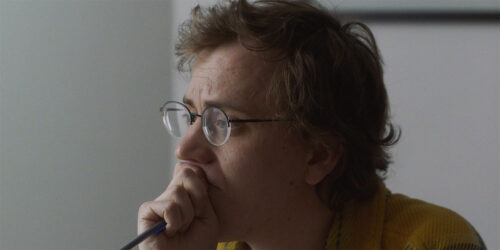The Heirloom
Status: Toronto Premiere
Date: Thursday November 28th 2024
Location: TIFF Lightbox
The Heirloom (Ben Petrie, Canada)
By Alexander Mooney
“I’m sorry for my 50% blame,” says Eric (Ben Petrie) to his partner Allie (Grace Glowicki) as they wait by the phone for news from the vet. Eric’s insistence that their recently adopted dog Millie (Cheers) change diets from raw chicken to cooked vegan—an effort to align this new member of their family more closely with its subtly controlling beta-male’s own healthy lifestyle—has yielded alarming gastric results. The shifty young man can feel the resentment and disappointment quietly radiating from Allie, who sits and rocks in her chair across the room, eyes cutting through him like only those of a loved one can.
By this point in Ben Petrie’s The Heirloom—a bite-sized domestic comedy that splits the difference between chamber drama and home movie—the couple at its centre have thoroughly tested the veracity of the old adage “communication is key.” Lost in the woods between playing fair and keeping score, Eric and Allie are too well-matched as restless, needling, and all-too-understanding arguers to ever bring their arguments to a productive place. Whether this is a source of strength for the couple or their ultimate undoing is a good question—one that Petrie’s slyly modest film pointedly refuses to answer.
The couple’s need for something to nurture other than each other as they enter COVID lockdown should be widely relatable to viewers still reeling from the pandemic’s abundance of down time; ditto their over-preparedness in arranging for the adoption, which breaks down according to their respective pathologies. Though Allie was the primary force behind the plan, Eric is the one who relentlessly researches, combing through countless how-tos on ownership and control. As he attempts to install a pet gate in the living room doorway, a podcaster’s voiceover speaks to the importance of tone, attitude, and aroma. “Think like a leader, stink like a leader… If you aren’t sure about your status in the pack, your counterfeit commands won’t pass the smell test,” he intones as Eric trips comically over the gate. These forceful disembodied commands will follow Eric throughout The Heirloom’s many sequences of detached discord, acting as distorted echoes of his inner conscience and self-defeating taunts that brim to the surface in his most vulnerable moments.
When the couple finally picks up their dog at an airport parking lot—a handoff sequence hilariously shot like a down-low drug deal—Eric insists that they remain stoic, and that any outward displays of affection toward the animal could potentially torpedo their position as pack leaders. Later that night, they sit paralyzed on the bed as they watch Millie mill about the bedroom. “Give her space,” Eric repeats like a constipated mantra, frozen and panicked at the prospect of this timid creature passing judgment upon him.
Petrie’s remarkable performance (countered perfectly by partner-in-crime Glowicki) skewers his character’s endless search for positions of moral certainty while also lending it a relatably human source. He is a neurotic man cursed with a surplus of self-awareness, visibly concerned about how he comes off—as much to an invisible audience as to the woman he loves—but constantly faced with his inability to control it. That he is also a filmmaker in the midst of writer’s block for a long-gestating project should not come as a surprise (indie filmmakers do love self-reflexive metaphors). At a pivotal midpoint, a stammering, impassioned Eric tells his bewildered partner that he is abandoning his screenplay; inspired by her stash of family videotapes, and the rocky introduction of Millie into the fold, Eric is instead determined to make his own version of a home movie. The justification hinges on reconciling two perceived poles in his familial makeup; the impulses of his father—the workaholic content to hide away from the people he provided for—and his mother—“baby-crazed” and reliant on her family to give her life meaning—are both supposedly present within him, and the only way to appease both will be to bring his craft into the home.
The aforementioned confrontation, charged with notions of blame and inadequacy as Millie’s intestinal fate hangs in the balance, is undercut mid-argument as a boom-mic operator darts across the frame to reposition. Elsewhere moments of strife and intimacy are restaged, and others called into question. The second half unmoors the audience and the characters from the surety of fact vs fiction, and allows the couple to lean head-first into their own histrionics, for better and for worse (the restrictions of its mid-COVID setting capture and enhance the mania of familial enclosure without belabouring the point; it’s a perfect excuse to lock the characters inside).
The Heirloom’s vested interests in the growing schism between its couple, and their misguided, semi-conscious attempts to turn that into art, never detract from its humour. They are, in fact, inseparable; that it builds toward the literal dissection of Millie’s poop is both a cosmic joke and an earnest emotional parallel, bringing its evocations of medical procedure and high-stakes proctology full circle. Whether it depicts a symbolic postmortem of the relationship or merely a regular checkup is not entirely clear, but if there’s anything concrete that The Heirloom leaves us with (other than the return of solidity to Millie’s leavings), it’s that nothing is final, and all things (people especially) are changeable in consistency and constitution; in other words, Shit Happens.
